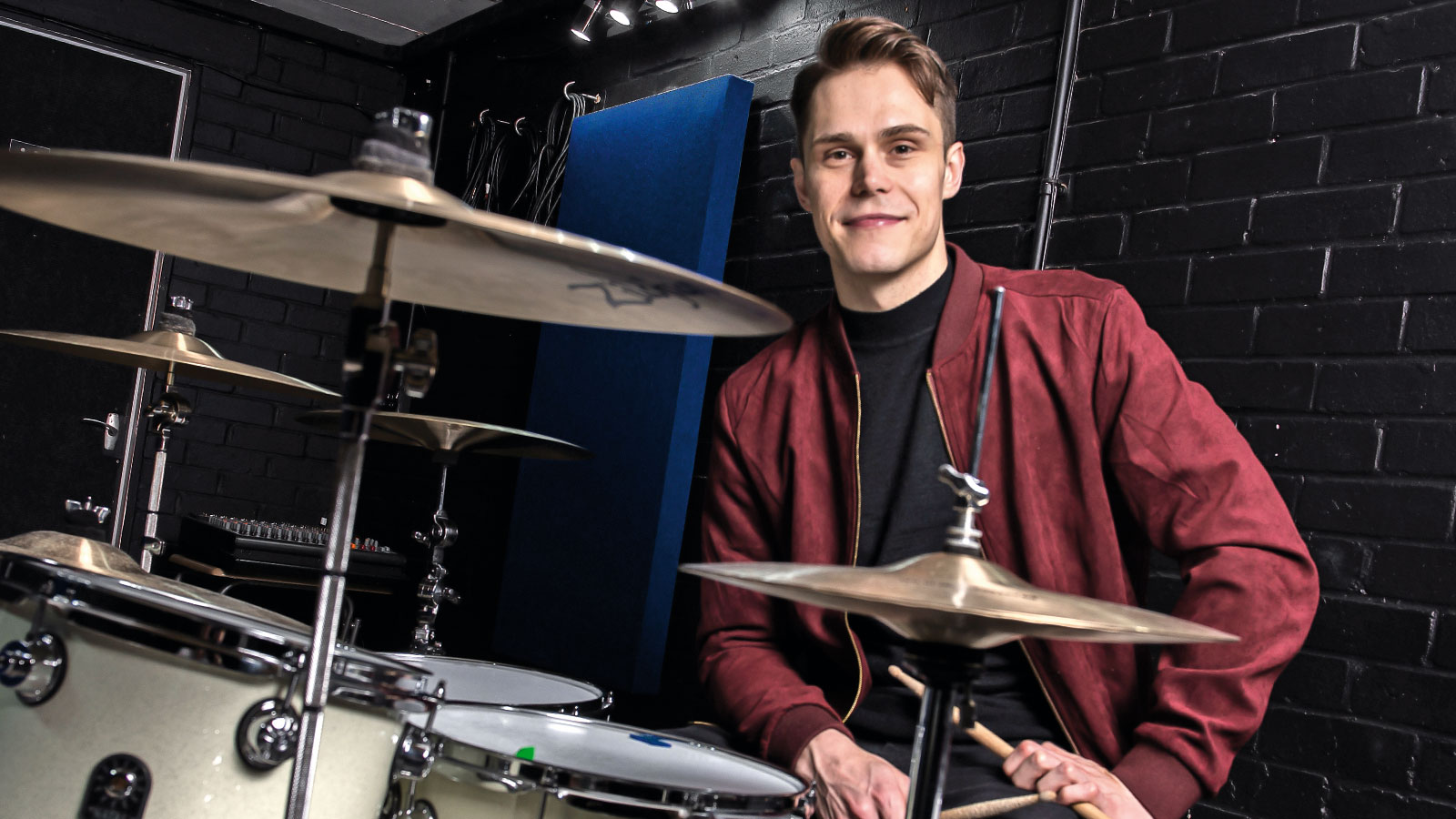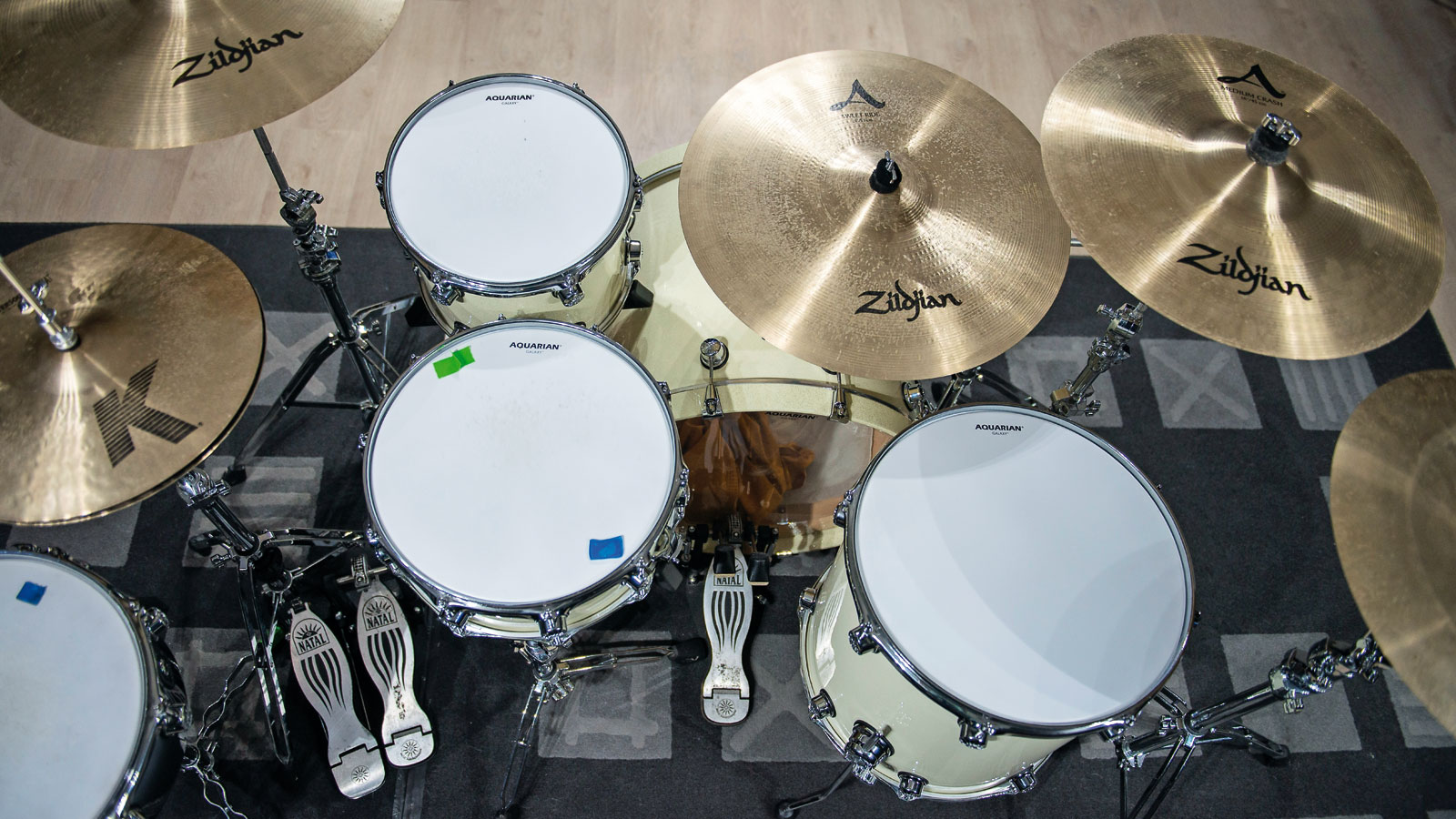Don Broco drummer Matt Donnelly on singing and playing with personality
Intricate-beat playing, high-note hitting singing drummer looks ahead to huge success with Don Broco

Introduction
Given that his introduction to music was the sounds of Phil Collins and The Carpenters and his musical chops were sharpened to Blink-182 and Taking Back Sunday, Matt Donnelly’s path seems to have been long laid out.
What else could he possibly ever become than a singing drummer? He’s certainly found his calling with Brit pop rockers Don Broco.
Here, he gets to not only channel his inner Travis Barker and Dan Flint, laying down interesting and intricate beats, but he also stretches his vocal muscles, backing up Broco frontman Rob Damiani throughout the band’s catalogue.
It’s a mix that certainly seems to be working. As this issue of Rhythm hits the shelves the band are in the midst of a UK tour that includes their biggest headline show to date, a night at Brixton Academy. This comes hot on the heels of their second album, Automatic, which earned rave reviews on its way to smashing into the UK Top Ten.
As the band prepared for their December UK jaunt, we caught up with Matt Donnelly to hear all about dodgy vocal technique, forging your own drum personality and following in the footsteps of Biffy Clyro…
As well as drumming with Don Broco you do a lot of backing vocals. Where did you first encounter singing drummers?
“I remember being in the car on family holidays and my dad was a huge Phil Collins and Genesis fan and my mum used to listen to The Carpenters a lot as well. From there I started discovering music for myself at around 13, and that was when we as a group of mates would go to gigs on our own and see bands like Blink-182, Foo Fighters and Taking Back Sunday. The natural next step from that was that we wanted to learn to play those songs and eventually write our own songs. I took up the drums and every lunchtime we would be at school learning our craft. We were all bad at our instruments, but we’d just be bad together!”

Clinging to singing
Did you take lessons from then on?
“I had lessons for the first year or so. I think because of the age I was at I grew tired of them a little bit. I found it frustrating.
"My teacher was an amazing drummer and he quite rightly had the emphasis on technique and all I wanted to do was play songs. I look back and regret that now.”
"Someone like Phil Collins had an incredible personality to his playing. Keith Moon was another one that I discovered early on."
Does not having that schooled background in a way free up your playing at all?
“The ideal balance is having a bit of both, that is the dream. If you had to have one or the other I’d rather have a good feel over a mathematical understanding of drumming. I’ve always admired drummers who have a personality in their playing.
"I love hearing a song and being able to tell straight away who the drummer is just from the drum part. Someone like Phil Collins had an incredible personality to his playing. Keith Moon was another one that I discovered early on who was a star in his own right through his playing.
"I try to put as much personality and care into the drum parts as possible. Because I’m self-taught, when I’m writing we rarely start with a drum part, I generally need something to bounce off. We tend to start with guitar parts and we build the drums from there.”
Your personality seems to come through on the album, Automatic.
“When you’re able to take stock after a period of writing and look back, it is nice to think that people will take your drum playing away as something extra to the songs.”
‘Nerve’ would be a good example of that. Where did the playing on the hoops on that particular track come from?
“I’m playing the hoop of the rack tom there. That was the last song we wrote for the record. I don’t know if it’s the OCD in me, I like to use every part of the kit when we’re doing an album. I love that full-circle symmetry of going all around the kit on your journey.
"‘Nerve’ was a blank slate, we just had little bits of ideas. It came from the piano loop, I just started playing some hats and grooves and it didn’t feel right, it felt like too much. I was thinking about how I could dynamically sit back and I thought I hadn’t played the hoops on the whole record so I thought I’d see how it felt. It has a different percussive quality to it and it seemed to work. You know when it feels right and it felt right.”
The title track has a real sparseness to it as well. Is that a sign of musical maturity, knowing when you can sit back?
“That song was one that when we were writing it, in earlier forms it felt dance-y. It had that consistent bass drum, that classic dance music technique. I was never going to leave it as that, that would have been far too boring.
"I started throwing in little accents and started building the dynamic into the chorus. It all seemed like the obvious thing to do once the song had the skeleton in place.”
Is that a timbale you’re playing on that song as well?
“It’s a Natal snare that I crank and take the bottom head off and it gives it a timbale kind of sound. It’s in the intro and the outro.
"That snare was just an experiment in the studio. We knew the kind of sound we were after. I tried a couple of different snares, the engineer brought in a snare and I just cranked them.
"We eventually found the right balance. I only use it in one song, but I’m sure I’ll find more uses for it as we write more songs.”
"Before Don Broco I was messing around in a band where I was the singer. When I started playing drums I didn’t want to give the singing up."
Coming back to singing and playing, how mindful do you have to be when writing that you’ve got a juggling act when playing live?
“I try to put singing to one side when I’m writing the drum parts. When Rob and I are putting the vocals together I try not to think about drums because I know that if I do I will panic. I just worry about it when I get to it [laughs]!”
You can thank mum and dad and the influence of Phil Collins and Karen Carpenter for that…
“I wasn’t aware of it as a kid but I have been able to go back on YouTube and admire clips of Phil Collins playing and singing and Karen Carpenter doing her thing. I appreciate that now with a much greater understanding of what is going on.
"Another person that was massive for me was Ben from Biffy Clyro. Biffy are one of those bands that all of our group of mates liked. I remember watching them headlining Reading a couple of years ago and just thinking, ‘Wow, they’ve done it, they’ve got to the pinnacle.’ And he’s nailed singing and drumming as well.”
When did you first start singing and drumming at the same time?
“It was right at the beginning. It was before I learnt drums, I was always singing along to songs. I sang along to a lot of Taking Back Sunday in my bedroom and that was what made me discover that I could sing in a high vocal register.
"Before Don Broco I was messing around in a band where I was the singer. When I started playing drums I didn’t want to give the singing up because I enjoyed it, so if ever there was an opportunity to sing backing vocals I would do it.
"Even if I couldn’t play drums very well I would always put my hand up to have a go at singing and drumming. I sucked at both to start with, I sucked at both equally. As time went on I sucked a little less and a little less.
"I speak to people who are drummers and would love to start singing and I don’t have any advice for them because I would imagine it is a lot harder doing it that way. If you’re already set out as a drummer then you have to re-train your body to do another thing.”
Has having that vocal background shaped your drumming style?
“Without doubt. You do sometimes have to consider the vocals and realise what is realistic for me to sing and play. Sometimes you can make so much more from a vocal if you give it a simple platform to shine from. It’s often said that when you listen to Don Henley with The Eagles there are times when he really allows the vocals to soar but not overcomplicate the accompaniment.
"I take that on board, you don’t need to be too flashy. There might be a really heartfelt vocal or lyric and it needs to be centre-stage by itself. But then you might have an instrumental section where you can go all guns-blazing with the drums. It’s important to find that balance within a song.”

Keep breathing
How do you manage the two live?
“Breathing is the key. But, it’s not something I consciously think about. I guess your body finds coping mechanisms as you tour and rehearse more. I have had some vocal lessons and experienced vocal coaches have told me my breathing is all wrong and I need to change this and that.
"Sometimes though you wonder if vocal teachers just want you to come back for more lessons! It’s important to be as relaxed as possible, I think. If you’re tense in your drumming that will affect your vocals. You have to be relaxed in your neck and your shoulders.
"That relaxation comes from knowing your songs inside out. If you know the songs you can sit back in them a little more. If you want to sing and drum you need to rehearse, rehearse, rehearse. When you’re coming from a position of confidence with a song then I think the audience can tell.
"We’ve had new songs in our set where I’ve been thinking, ‘Oh no, this is coming up, this is hard.’ That probably does translate in your playing. Once those moments click it is so much better.”
You mentioned Biffy Clyro earlier. Are they the model of success for British bands to follow?
“They are hugely inspiring, especially when you understand the journey that they’ve been on. When I was 16 and went to watch Biffy I didn’t appreciate that they’d been working hard for years.
Now, having been in this position, neither Biffy nor ourselves are overnight bands.We’ve built this gradually and gone through the experience of buying a crappy van and getting out there playing shows first to no one and then to someone and then to a few people.
"I’m not suggesting we will reach the same heights as Biffy, but you’ve got to dream haven’t you?”
"The relationship with your fan base is such a special thing in rock music."
They’ve done it the right way as well, building bit by bit, album by album…
“It’s more sustainable doing it this way. If you’re an overnight success you won’t get that core loyalty from your fan base, the ones you know that have always stuck with you. You can be a flash in the pan and blow up really quick but people will move on to the next thing.
The relationship with your fan base is such a special thing in rock music. Our first big landmark as a band was when we sold out Koko. To me that was such a big thing as it’s an iconic venue.I never thought we’d do that. I remember feeling like everyone who was a fan of the band had all come together and we were all sharing this moment.”
You’ve gained some unexpected publicity this year, as ‘Automatic’ featured on the Madden NFL 16 game.
“That was absolutely awesome when we heard about that. It’s a massive game. You can tell because if you watch the video for ‘Automatic’, in the comments people are saying they found that song through Madden. That is so cool and it opens us up to a huge US market. That’s great because we haven’t focused over there so it’s great to have a bit of a leg-up.
"These days we’re saturated with social media and access to music. It’s never been easier to hear a new song. That is an asset for new artists but it is also easy to get lost in the noise because there’s so much out there.
"When it’s something a little more structured like a game soundtrack, there’s a finite number of songs and people will hear those sounds as they’re in the game’s menu screens, that’s great. Movie soundtracks, video games, anything like that is a huge asset.”
Rich is a teacher, one time Rhythm staff writer and experienced freelance journalist who has interviewed countless revered musicians, engineers, producers and stars for the our world-leading music making portfolio, including such titles as Rhythm, Total Guitar, Guitarist, Guitar World, and MusicRadar. His victims include such luminaries as Ice T, Mark Guilani and Jamie Oliver (the drumming one).
